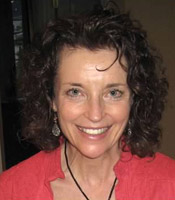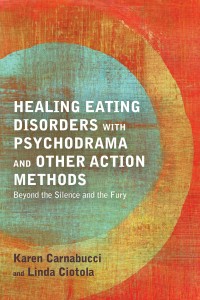 JKP author Linda Ciotola, M.Ed., TEP, ACE Certified Health Coach, Personal Trainer, Fitness and Yoga Instructor shares her experience and expertise from a recent 90 minute workshop—Learn to Love Your Body Through Yoga. Linda is co-Author, with Karen Carnabucci, of Healing Eating Disorders with Psychodrama and Other Action Methods—Beyond the Silence and the Fury.
JKP author Linda Ciotola, M.Ed., TEP, ACE Certified Health Coach, Personal Trainer, Fitness and Yoga Instructor shares her experience and expertise from a recent 90 minute workshop—Learn to Love Your Body Through Yoga. Linda is co-Author, with Karen Carnabucci, of Healing Eating Disorders with Psychodrama and Other Action Methods—Beyond the Silence and the Fury.
In our book on healing eating disorders we emphasize the benefits of a holistic approach to the treatment of issues such as disordered eating, body dissatisfaction, related mood disorders and more. Action methods which involve the body as well as the mind, heart, and spirit are particularly effective and lend themselves to collaboration with several other modalities which we explore in our book: art, music, mindfulness, Reiki and other energy work, acupuncture, yoga, and more. Case studies and a variety of examples illustrate a number of creative options.
In a recent 90 minute workshop given at a yoga studio, I combined action methods, education, mindfulness, poetry, art and yoga so participants could experience the power of integrating these modalities.
Following introductions and group guidelines (confidentiality, self-care, freedom to choose one’s level of participation and an overview of class, and so on), I introduced the class to the concept of “the Witness Role”—the part of the self that can step back and observe thoughts, feelings, and behaviors without judgment and with compassion.
Prior to class, I had blessed the room with Reiki and placed a selection of artistic photograph cards (spring landscapes*) along the window sills. Group members were invited to select a card that could “ . . . hold the Role of the Witness for you throughout today’s workshop. Share the card and reasons for choosing the card with one other person in the room whom you do not know.” Then, cards were placed somewhere in the room where each card could “hold the role of the Inner Witness” for the time of the workshop.
Then, returning to our circular seating arrangement, class members were instructed to look in their folder for a copy of a poem which I selected related to the theme. After reading, members shared verbally which lines of the poem resonated with them.
Following this, was the teaching of basic yoga principles specifically as they apply to issues around making peace with food and the body and developing “the Self-Care Role”. Topics included “Yamas” of non-harm to self and others; truthfulness to self and others; being authentic; discerning the difference between needs and wants; moderation; and releasing attachments to outcomes. Next, the “Niyamas” for cultivating a healthy inner life: external and internal purity; “the body is a temple of the spirit”; practice of contentment and maintaining equanimity—responding to life with love and faith, not from fear; cultivating passion for health rather than obsession with weight or appearance; practice of self-observation (i.e. Inner Witness Role) by taking time to pause and breathe to understand one’s reactions and triggers; and the practice of surrender.
Next, ways of incorporating these into life were explored, beginning with the breath and the experience of noticing one’s breath mindfully followed by yoga breathing. Following this was meditation on and off the mat, both with movement and in stillness. And following was brief teaching about the power of positive affirmations; journaling; the necessity of movement balanced with stillness; getting support and practicing gratitude.
All teaching points were covered in handouts including the research supported benefits of Hatha Yoga such as the elevation of serotonin, helping alleviate depression, ADHD, anxiety and yoga’s multiple physiological benefits.
The class drew to a close with members each returning to the space where “the witness card” had been placed. “Take the role of your witness and look at ‘yourself’ (envisioned on the mat or bolster where they had been seated) and in a few sentences from the Witness Role, tell yourself what you observed and the ‘take home’ message from the workshop.” After each participant did this, the circle re-formed and each person stated his/her name with a hand on heart re-affirming the pledge of confidentiality and self-care. For closing, the word and gesture, “NAMASTE” which is a slight bow, hands held in “prayer pose” by the heart, meaning “The Light in me honors the Light in you.”
The workshop feedback forms showed a consensus of the group members’ experiences as:
“ . . . inclusive, thoughtful, gentle, non-judgmental . . . loved the learning and the helpful reminder of how to incorporate yoga into my recovery . . .”
*Thanks to Landscape photographer and poet Alma Nugent for providing these.
For more information or to buy Healing Eating Disorders with Psychodrama and Other Action Methods, please visit our website.